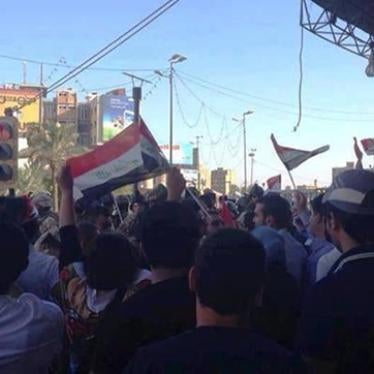(Baghdad) – Violent deaths in Iraq doubled in 2013 as al-Qaeda in Iraq and other armed groups carried out attacks that killed more than 8,000 Iraqis, Human Rights Watch said today in its World Report 2014. The government failed to protect its citizens, and security forces instead carried out brutal counterterrorism measures.
Militias carried out assassinations that led to the displacement of thousands of families, with no one brought to justice for their crimes. The authorities used arrests, criminal charges, and violence to intimidate protesters and journalists who expressed opposition to the government.
“Iraqis today are caught between state-sponsored violence and terrorist attacks,” said Joe Stork, deputy Middle East and North Africa director. “Iraq’s people face a government that uses abuse to maintain its grip on power, while its grip on security has slipped.”
In the 667-page world report, its 24th edition, Human Rights Watch reviews human rights practices in more than 90 countries. Syria’s widespread killings of civilians elicited horror but few steps by world leaders to stop it, Human Rights Watch said. A reinvigorated doctrine of “responsibility to protect” seems to have prevented some mass atrocities in Africa. Majorities in power in Egypt and other countries have suppressed dissent and minority rights. And Edward Snowden’s revelations about US surveillance programs reverberated around the globe.
The government curtailed the right of Iraqis to assemble freely by requiring demonstrators to obtain advance permits from the Interior Ministry, which consistently refused permission. In August and November, security forces attacked peaceful demonstrations in Baghdad and Nasiriyya, where demonstrators were protesting against widespread corruption, and arrested activists and journalists who attended.
Security forces, including SWAT teams in the Counterterrorism Service, Federal Police, and the army used abusive and illegal techniques during arrests, interrogations, and detentions. In November and December, during the holy month of Muharram, security forces arrested hundreds of people without warrants and held them incommunicado for prolonged periods in “preventive detention.”
Authorities have not held security forces accountable for using excessive or unnecessary violence against demonstrations, particularly on April 23 in Hawija, when SWAT and army officers killed at least 51 peaceful protesters.
Iraqi authorities also failed to hold anyone accountable for at least 100 assassinations in November and December, of both Sunnis and Shia. Many of the victims’ bodies were found mutilated. Residents of majority Shia areas throughout the country said that a militia believed to have close ties to the ruling State of Law party of Prime Minister Nuri al-Maliki carried out assassination campaigns to displace Sunnis from these areas. The authorities failed to take any steps to investigate a spate of targeted assassinations that killed four journalists in Mosul in two months.
“Rather than undertake impartial investigations, trials based on evidence, and reform of the corrupt judicial apparatus, Iraqi authorities appear to prefer to expand the use of their own abusive practices,” Stork said. “Iraqis today confront threats from all sides, not least from their own government.”







